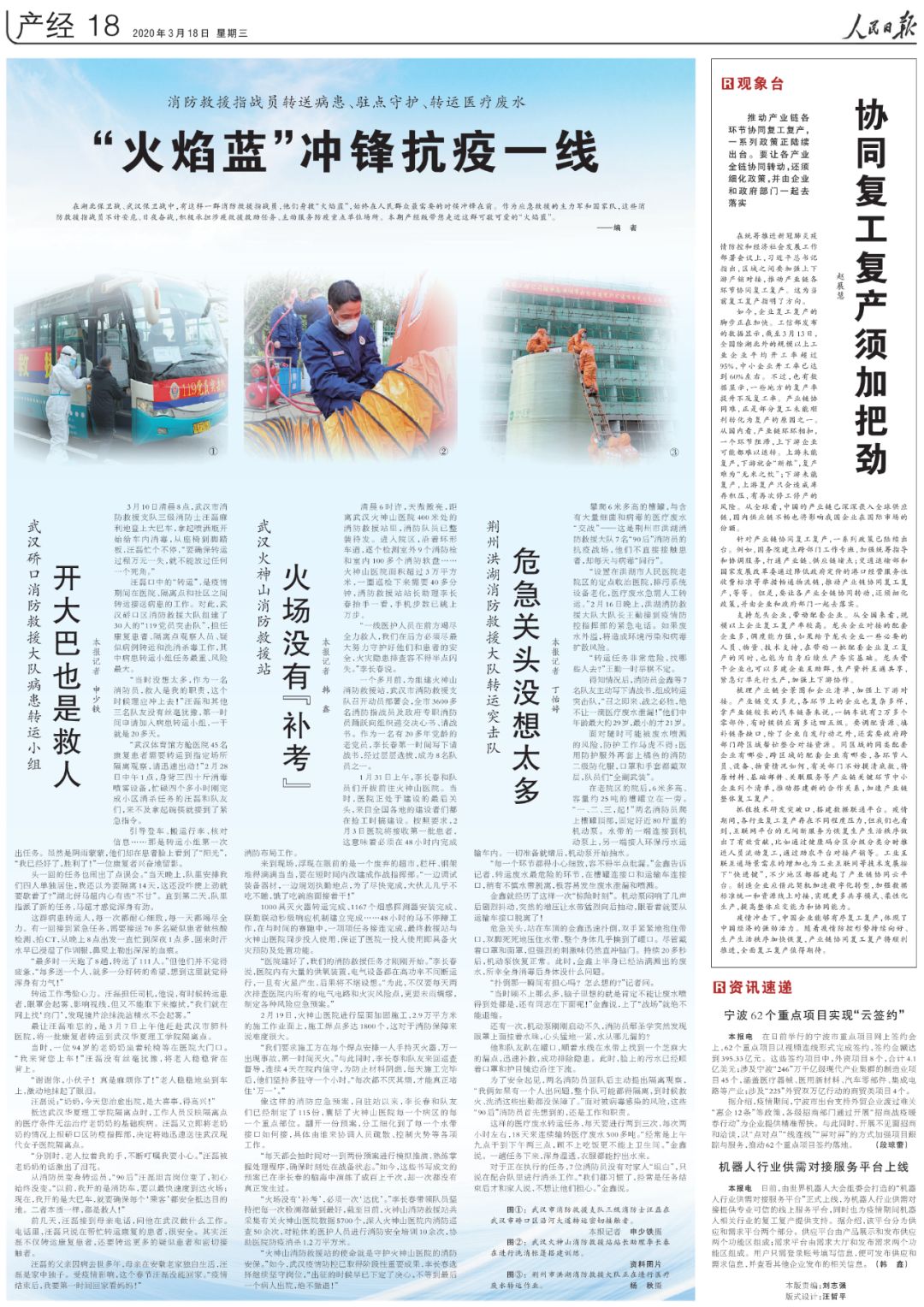
On March 18, 2020, the 18th edition of the People's Daily published ""Flame Blue" assault on the front line of anti-epidemic: Fire and rescue commanders transfer patients, station guards, and transfer medical wastewater", the content is as follows:
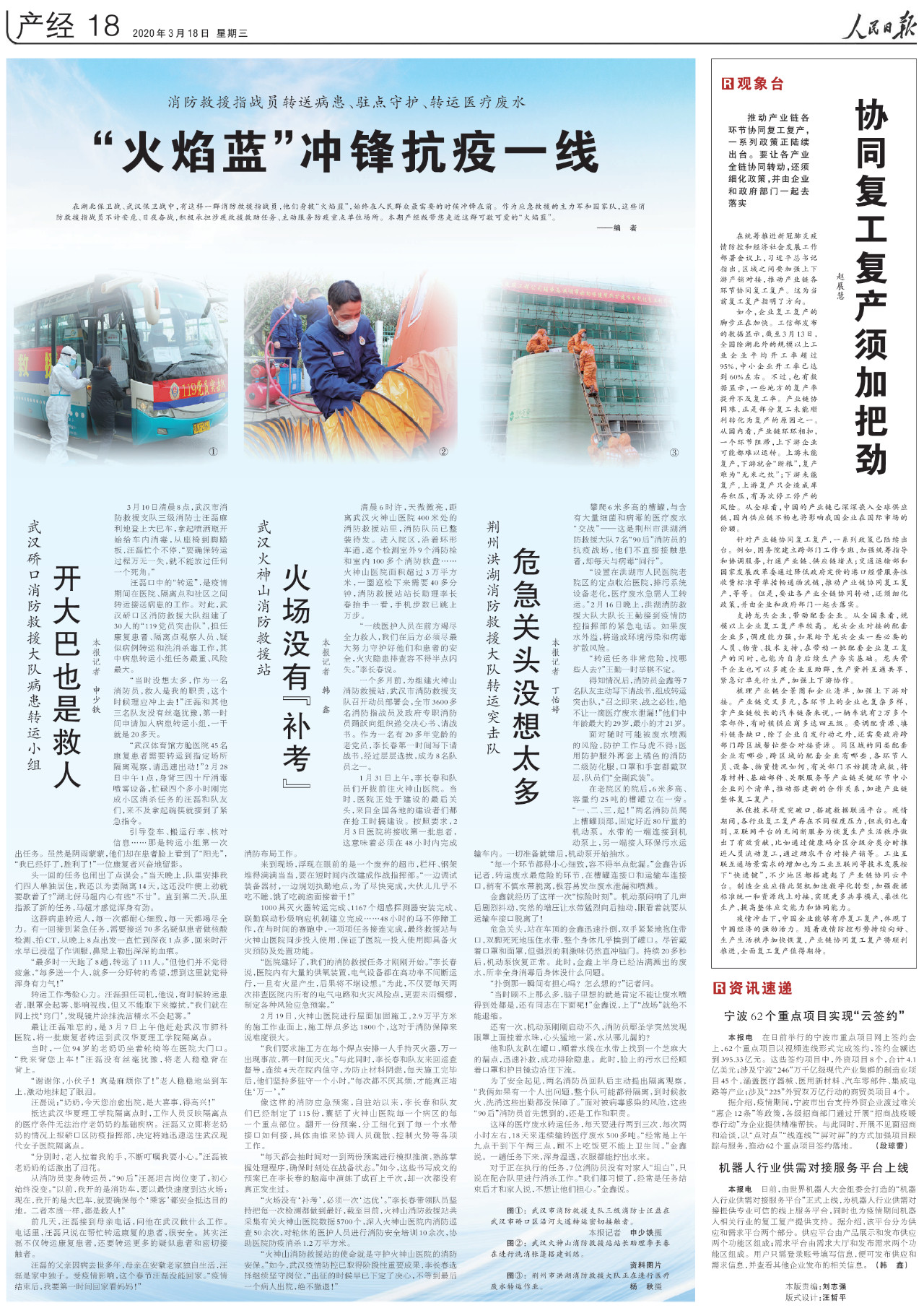
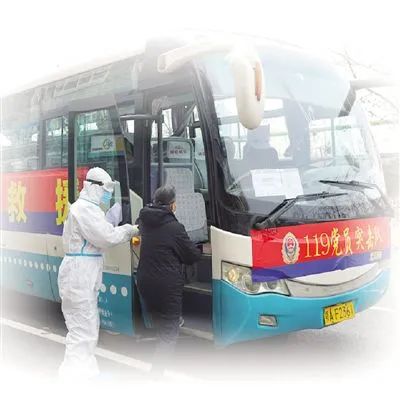
Wang Lei, a third-level firefighter of the Wuhan Fire Rescue Detachment, transferred close contacts on Yanhe Avenue in Qiaokou District, Wuhan. Photo by reporter Shen Shaotie
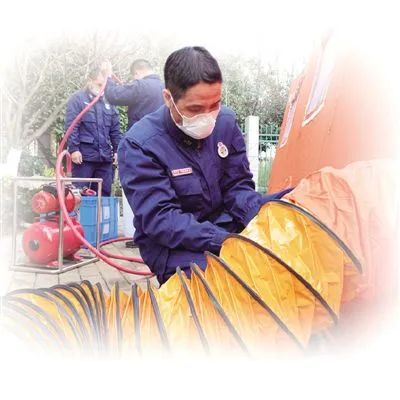
The assistant to the head of the Wuhan Huoshenshan Fire Rescue Station *** is training to build decontamination tents. Profile picture
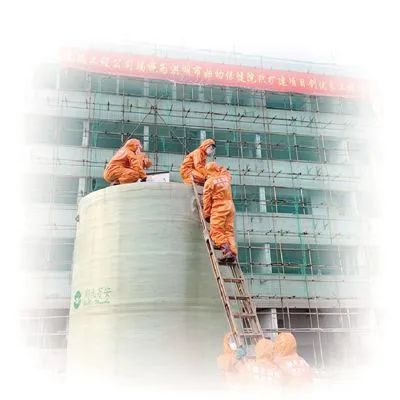
The Honghu Fire Rescue Brigade of Jingzhou City is carrying out medical wastewater transfer operations. Photo by Yang Qiu
In the defense of Hubei and Wuhan, there was such a group of fire rescue commanders, wearing "flame blue", always charging forward when the people needed it most. As the main force of emergency rescue and the national team, these fire rescue officers work hard day and night regardless of safety, actively undertake rescue and rescue tasks related to the epidemic, and actively serve key epidemic prevention units. Let us take you closer to this group of respectable and lovely "flame blue".
——Editor
Patient Transfer Team of Wuhan Qiaokou Fire Rescue Brigade
Driving a bus is also saving people
Reporter Shen Shaotie
At 8 o'clock in the morning on March 10, Wang Lei, a third-level firefighter of the Wuhan Fire Rescue Detachment, quickly boarded the bus, picked up the spray bottle and started disinfecting the interior of the car. From the seat to the pedals, Wang Lei was busy. , "To ensure that the transshipment process is foolproof, you cannot let go of any blind spots."
The "transportation" in Wang Lei's mouth refers to the transfer of patients between hospitals, isolation points and communities during the epidemic. In response, the Wuhan Qiaokou District Fire Rescue Brigade formed a 30-person "119 Party Member Commando" to serve as rehabilitation patients, quarantine point observers, suspected case transfer, decontamination and anti-virus work. Among them, the patient transfer team has the heaviest and risky tasks. maximum.
"I didn't think too much at the time. As a firefighter, it is my duty to save people. At this time, I should rush forward!" Wang Lei and the other three teammates did not hesitate to apply to join the patient transfer team at the first time. More than 20 days.
"The 45 recovered patients in the Fangcai Hospital of Wuhan Gymnasium need to be transferred to a designated place for isolation and observation, please dispatch quickly!" At 1 o'clock on February 28, with 30 or 40 kilograms of disinfection spray equipment on his back, he had just completed the community elimination after busying for more than four hours. Wang Lei and his teammates who killed the quest received urgent instructions before they could pick up the dishes.
Guide boarding, carry luggage, check information... That was the first time the transfer team was tasked. Although it was cloudy and rainy, they saw the "sunshine" on the patient's face, "I am healed, I have won!" A rehabilitated person took a photo with excitement.
The first mission also caused some misunderstanding. "That night, the team arranged for the four of us to live alone. I thought I would be isolated for 14 days. I would have to rest before I tried to work hard?" Hubei Ma Chao was somewhat "unwilling" in his heart. It wasn't until the next day that the team assigned a new task that Ma Chao felt energetic.
This group of patient transporters are patient and meticulous every time and do their best every day. Once I received an urgent task, I needed to pick up more than 70 suspected patients for nucleic acid testing and CT scans. I was busy from 8 pm until 1 pm. When I came back, my sweat was already soaking my training clothes, and the bridge of my nose was drawn deep. Deep blood stains.
"At most, I ran 8 times a day and transferred 111 people." But they didn't feel tired. "Every time one more person is sent, there is more hope of getting better, and I feel full of energy when I think about it!"
Transshipment work tests mental strength. Wang Lei served as the driver. He said that sometimes when transferring patients, the eye mask will fog up and affect the vision, but it cannot be removed and wiped. “We looked for'tricks' on the Internet and found that the lens will not fog up when it is applied with detergent. "
The most unforgettable thing for Wang Lei was that he rushed to Wuhan Pulmonary Hospital on the morning of March 7 to transfer a group of recovered patients to the isolation point of Wuhan Huaxia Institute of Technology.
At that time, a 94-year-old grandmother was waiting at the gate of the hospital in a wheelchair. "I'll carry you in the car!" Wang Lei did not hesitate, putting the old man on his back firmly.
"Thank you, boy! I really trouble you!" The old man sat firmly in the car and wiped his eyes excitedly.
Wang Lei said: "Grandma, today you are cured and discharged from the hospital. It is a happy event, so please be happy!"
When I arrived at the isolation point of Wuhan Huaxia Institute of Technology, the staff reported that the medical condition of the isolation point was unable to treat the basic illness of the old woman. Wang Lei immediately reported the old woman's situation to the Qiaokou District Epidemic Prevention Headquarters and decided to send her to the isolation point of Wuhan Modern Women's Hospital.
"When I was parting, the old man took my hand and kept telling me to be careful." Wang Lei was aroused by the old grandma's words.
From a firefighter to a transporter, "post-90s" Wang Lei said frankly that his position has changed, and his original intention has not changed. "Before, I drove a fire truck and had to reach the fire site as quickly as possible; now, I drove a bus, and I had to make sure that every'passenger' arrived at the destination safely. Both are essentially the same, they both save people. !"
A few days ago, Wang Lei received a call from his mother asking him what kind of work he does in Wuhan. On the phone, Wang Lei only said that it was safe to help transport recovered patients. In fact, Wang Lei not only transports recovered patients, but also more suspected patients and close contacts.
Wang Lei’s father died of illness for many years, and his mother lived alone in his hometown in Anhui. Wang Lei was the only child in the family. Affected by the epidemic, Wang Lei failed to go home this Spring Festival. "After the epidemic is over, I will go home to see my mother as soon as possible!"
Wuhan Huoshenshan Fire Rescue Station
There is no "make-up test" at the fire site
Reporter Han Xin
At 6 o'clock in the morning, the sky was slightly bright, and the firefighters were ready to go in the fire rescue station 400 meters from Wuhan Huoshenshan Hospital. Entering the hospital area, along the circular driveway, one by one inspects 9 outdoor fire hydrants and more than 100 indoor fire floppy disks... Huoshenshan Hospital covers an area of more than 30,000 square meters, and it takes more than 40 minutes to complete a round of inspections. Fire rescue station chief Assistant Li Changchun raised his hand to see that the number of steps on his mobile phone had jumped to 10,000 steps.
"The front-line medical staff are doing their utmost to save people in the front. We must do our best to protect the safety of them and the patients in the rear. The investigation of fire hazards cannot tolerate the slightest mistake." Li Changchun said.
More than a month ago, in order to establish the Vulcan Mountain Fire Rescue Station, the Wuhan Fire Rescue Detachment held a mobilization and deployment meeting. More than 3,600 firefighters and full-time government firefighters across the city actively submitted letters of determination and petitions to the organization. As a veteran party member with more than 20 years of party experience, Li Changchun wrote the invitation letter for the first time, and was selected as one of the eight players.
On the morning of January 31, Li Changchun and his team members went to Huoshenshan Hospital. At that time, the hospital was in the final juncture of construction, and builders from all over the country were rushing to build. According to the requirements, the hospital will receive the first batch of patients on February 3, which means that the fire layout work must be completed within 48 hours.
When came to the scene, what appeared in front of him was an abandoned supermarket, full of railings and steel frames, and it was to be transformed into a combat headquarters in a short time. "While debugging equipment and equipment, while planning the duty location, in order to complete it as soon as possible, everyone hardly eats or sleeps. When hungry, they eat a bowl of instant noodles and continue to dry!"
The transfer of 1,000 fire extinguishers was completed, the installation of 1,167 smoke detectors was completed, and the second-level response mechanism of joint logistics linkage was established...48 hours of non-stop work, in the race against time, one task after another was completed, and finally the rescue station and The Vulcan Mountain Hospital was put into use simultaneously, ensuring that the hospital has fire prevention and handling functions as soon as it is put into use.
"The hospital is built, and our fire rescue mission has just begun." Li Changchun said that there are a large number of oxygen supply devices in the hospital, and the electrical equipment is running at high power. Once sparks occur, the consequences will be unimaginable. "For this reason, not only must we check all electrical circuits and fire risk points in the hospital twice a day, but we must also plan ahead and formulate various risk emergency plans."
On February 19, the Vulcan Mountain Hospital carried out roof reinforcement construction. There were as many as 1,800 welding spots on the 29,000 square meter construction work surface, which is very difficult for fire protection.
"We require the construction party to arrange a person to hold a fire extinguisher at each welding spot, and in case of an accident, the fire will be extinguished as soon as possible." At the same time, Li Changchun and his teammates went back and forth to inspect and supervise, and were on duty in the courtyard for 4 consecutive days. After the construction was completed every day, they insisted on staying for an hour. "Every time you don't get bored, you can really block the'what if'."
Since stationing in the station, Li Changchun and his teammates have formulated 115 fire emergency plans like this, covering every key part of every ward of Huoshenshan Hospital. Open a plan, and the division of labor is detailed to how to connect each hose interface, and who is responsible for coordinating personnel evacuation and fire control.
"Every day I will take time to simulate one or two plans, master the processing procedures, and ensure that they are always in a state of combat readiness." Today, these written plans have been drilled hundreds of times in Li Changchun's mind. It never really happened once.
"There is no're-examination' at the fire site, and it must be'achieved once'." Li Changchun led the team members to insist on doing the best in every test. Up to now, the Vulcan Mountain Fire Rescue Station has collected 5,700 data about Vulcan Mountain Hospital and went deep into Huoshen Mountain. More than 50 fire inspections in the hospital, more than 10 fire safety trainings for medical staff on shift, and assisted the hospital in epidemic prevention and killing 12,000 square meters.
"The mission of the Huoshenshan Fire Rescue Station is to protect the fire safety of the Huoshenshan Hospital." Now that the Wuhan epidemic prevention and control has achieved important phased results, Li Changchun chose to continue to stick to his post. "When he went out, he had already made up his mind and won’t wait for the last one. The patient is discharged from the hospital and never retreat!"
Jingzhou Honghu Fire Rescue Brigade Transit Commando
I didn’t think too much about the crisis
Reporter Ding Yiting
Climbing tanks more than 6 meters high, "battle" with medical wastewater containing a lot of bacteria and viruses-this is the battlefield of 7 "post-90s" firefighters from Honghu Fire and Rescue Brigade in Jingzhou City. They do not directly contact patients , But "walking" with the virus every day.
"It is set up in the designated hospital in the old district of Honghu People's Hospital. The sewage system equipment is aging, and the medical wastewater is in urgent need of manual transfer." On the evening of February 16, Wang Qin, head of the Honghu Fire Rescue Brigade received an emergency from the epidemic prevention and control headquarters. phone. If wastewater overflows, it will cause environmental pollution and the risk of virus spread.
"The transfer task is very dangerous. Who should I go to?" Wang Qin was uncertain.
After learning about the situation, 7 teammates including firefighter Jin Xin took the initiative to write down the invitation letter to form a transfer commando team, "Call it, win the battle, and never let a drop of medical wastewater leak!" The oldest of them is 29 years old. , The youngest is only 21 years old.
Faced with the risk of being splashed by waste water at any time, the protection work must not be sloppy: medical protective clothing is then put on an orange fire-fighting grade two chemical protective suit, masks and gloves are double-layered, and the team members are "fully armed."
At the back of the old courtyard, a tank with a height of more than 6 meters and a capacity of about 25 tons stands aside. "One, two, three, get up!" Two firefighters climbed onto the top of the tank and secured a motorized pump weighing nearly 80 kilograms. One end of the hose is connected to the motorized pump, and the other end is connected to the environmentally friendly sewage transport vehicle. When everything is ready, the motorized pump starts pumping water.
"Every link must be careful and meticulous, and no leaks are tolerated." Jinxin told reporters that the most dangerous link in the transfer of wastewater is the accidental release of the water belt at the tank connection port and the transport truck connection port, which is very easy to cause wastewater leakage. And splashing.
Jinxin experienced such a "thrilling moment". The motor pump shook violently after a few muffled noises, and the sudden pressurization caused the hose to twitch violently, and it was about to separate from the transport truck interface!
At a critical juncture, Jin Xin, who was standing on the roof of the car, quickly threw himself down. He hugged the belt tightly with his hands and pressed the hose with his feet, and his whole body almost reached the mouth of the can. Although wearing a mask and face mask, the strong irritating smell still hits his forehead. After more than 20 seconds, the motorized pump returned to normal. At this time, Jin Xin's upper body was already covered with spilled waste water. Fortunately, there was nothing wrong with his body after the whole body was disinfected.
"Are you worried at the moment you fell? What do you think?" the reporter asked.
"At that time, I couldn't take care of that much. I was thinking that the waste water must not be sprayed everywhere, and there are comrades below!" Jin Xin said, on the "battlefield" he must not shrink back.
Another time, shortly after the motor pump was started, Yan Shengxue, a firefighter, suddenly noticed that water droplets were hanging on the eye mask, and his heart suddenly tightened. Where did the water leak?
He and his teammates lay on the mouth of the tank, and found a big leak on the water line along the water line, quickly remedied it, and successfully eliminated the hidden danger. At this time, the sewage on his face has flowed down the edge of the mask and goggles.
For the sake of safety, the two firefighters took the initiative to isolate and observe after returning to the team. "If one of us has a problem, the entire team may have to be quarantined. At that time, fire fighting and decontamination of these attendance will not be guaranteed." Faced with the virus. The risk of infection, the first thing these "post-90s" firefighters think of is their job and responsibilities.
This kind of medical wastewater transfer task is carried out two to three times a day, every two hours or so, and more than 500 tons of medical wastewater are continuously transferred for 18 days. "It's often from nine in the morning to two or three in the afternoon, and you can't go to the bathroom if you don't care about meals," Jin Xin said. After a mission, I was soaked, and my clothes could be squeezed out of water.
Regarding the task being performed, the seven firefighters did not "confess" to their family members, only saying that they were killing them in the team. "We are all used to it. We often talk to family members after the task is over, and don't want them to worry." Jin Xin said.



